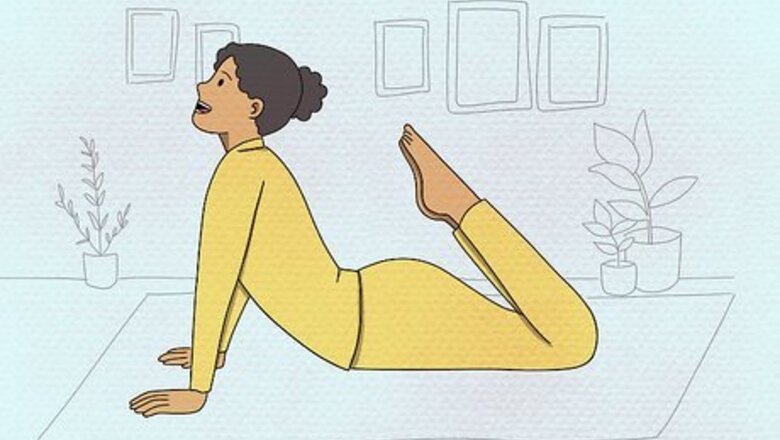
views
- Move your body to shake off those nerves by going for a walk, dancing around, or shimming your body before you step on stage.
- Make time in your performance day routine to relax and sit with your thoughts.
- Kick the fear of failure to the curb by practicing every day by yourself or in front of a rehearsal audience.
Exercise and move your body.
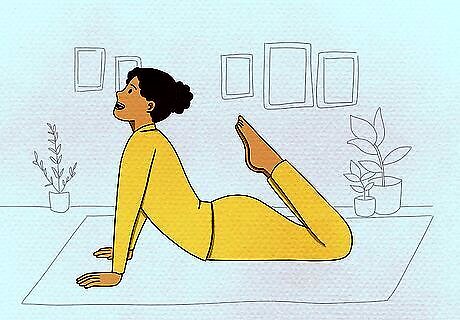
When you're physically active, your body releases endorphins. These happy hormones help raise your confidence, lower stress, and put you in a great mood. Try doing at least 30 minutes of exercise before you step in front of an audience. Take a walk around the block or theater before the doors open. Do yoga the morning of your performance to ease your mind and stretch your body. Dance backstage to release any built-up energy. Try doing power poses before you walk on stage. For instance, place your hands on your hips with your chest out like Wonder Woman.
Watch a funny video.

Sometimes, all you need to loosen up is a good laugh. Put on your favorite movie or a funny comedy sketch while you’re getting ready to help you relax. Believe it or not, laughter actually helps you destress and reduce anxiety. Focus on what’s playing rather than worrying about the performance, and let out all of those giggles. Try watching a motivational speech to help you feel more confident. Make sure to watch your funny video before doing your makeup—tears of laughter don’t pair well with mascara.
Take time to relax.
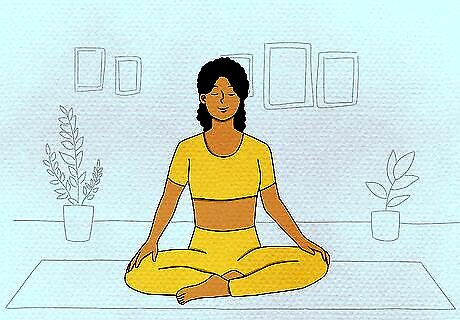
Meditation and deep breathing exercises can help you calm down. Before you step in front of an audience, take some alone time to ease the tension from your body. Sit down in a quiet space and meditate for 15 to 20 minutes, or close your eyes and count your inhales and exhales. Let the worries and fears of performing slip away. It’s okay if they pop up while you meditate or breathe, but allow them to come and go rather than focusing on them.
Shake out your jitters.

Flap your arms and legs around before you hop on stage. Believe it or not, a little wiggle before you start your performance or presentation can make a big difference. Those butterflies in your stomach and your racing pulse come from built-up nerves and stress. Many performers find that shimmying their bodies before they step on stage helps them relax and physically shake away their nerves. Try playing the shake-out game backstage. Shake a limb 16 times, then move onto another, and then another. Repeat for a count of 8, 4, 2, and 1.
Stand or sit up tall.
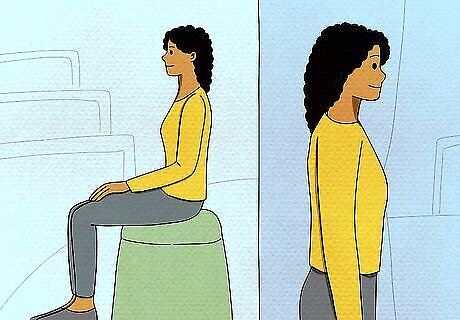
Your posture can drastically change your mood, so try to sit up straight. If you’re feeling a bit nervous before you present your speech or go on stage, take a deep breath and roll your shoulders back. Standing or sitting up taller boosts your confidence levels, giving you the strength to overcome stage fright. If you’re sitting, scooch to the edge of your chair (if you can), as this can help you sit up straighter.
Set yourself a timer.
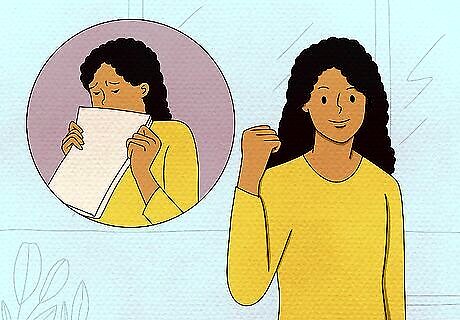
Tell yourself you’re only allowed to be nervous for a certain amount of time. It may sound silly, but giving yourself the time to be nervous can help you overcome your stage fright. Sit with those scared or jittery feelings for 30 minutes or an hour. Then, when the allotted time is up, stand up, brush it off, and say, “I got this!” This tip doesn’t work for everyone, and that’s okay. The goal isn’t to feel 100% stage fright free at the end of your nervous time; it’s to give yourself space to focus on what you feel so you can redirect your attention to other things more easily.
Avoid caffeine.
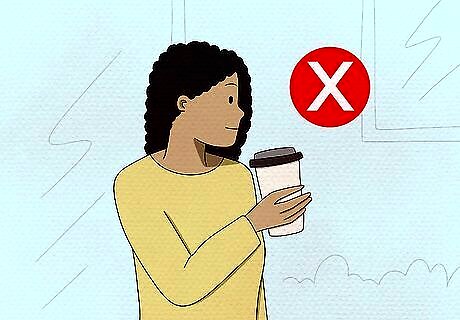
Coffee and soda cause your adrenaline to rise, giving you even more jitters. So, consider skipping your morning cup of Joe the day of your performance, and opt for a tall glass of water instead. Your body will thank you, and so will the dry mouth caused by stage fright. If you need an energy boost, try eating a balanced meal or taking a power nap.
Tell yourself positive aspirations.
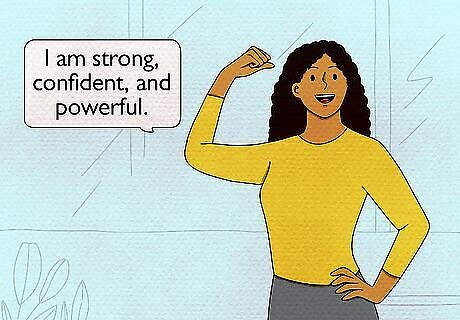
Before you walk on stage, give yourself an encouraging word. Self-doubt can be a big mood dampener (not to mention a confidence crusher). Silence those anxious and intrusive thoughts with positive, self-affirming ones to feel empowered. Whisper them while you get ready or scream them into the empty theater before the audience arrives. Here are some uplifting mantras you can try: I am capable of achieving greatness. I can and will succeed. I believe in myself. I can achieve whatever I set my mind to. I am strong, confident, and powerful. Beyoncé Knowles Beyoncé Knowles, Singer & Businesswoman If you experience nerves, channel them so that they fuel you. "I think it's healthy for a person to be nervous. It means you care – that you work hard and want to give a great performance. You just have to channel that nervous energy into the show."
Think of the audience as friends.

Pretend you’re presenting to your best friend, not a room full of strangers. One of the many causes of stage fright is the fear of failure. Screwing up in front of a live audience? Awful. Screwing up in front of your best friends? Laughable! Imagining that you’re speaking in front of people you love can help you feel more at ease and lessen those performance jitters. Make your vision a reality by asking a friend to sit in the front row. This way, you can look to them whenever the nerves rise. If making eye contact with the audience makes you more nervous, no worries! Stare over their heads at a spot on the wall—they won’t know the difference.
Rehearse every day.

Silence thoughts of failure with practice, practice, practice! The best way to overcome stage fright is to make sure you know your routine, speech, or lines by heart. Stage fright is a mixture of fearing failure and self-doubt. By rehearsing every day leading up to the performance, you can nip that fear in the bud. Record yourself while you’re practicing and watch or listen to it back to see where you can improve. This can help you be more confident, as you’ll know exactly what you’ll look and sound like. Time your presentation or speech as you practice so you know if you need to slow down or speed up beforehand. Practice in front of a pretend audience full of friends and family members. Ask those you practice in front of how you did to get feedback before your big day.
Stick to a routine.

Sometimes, a set schedule or ritual can help you feel more at ease. Plan out the day of your performance or presentation. What time will you wake up? What will you eat? How will you dress? When should you leave for the venue? Think about what will help you succeed and execute it. Aim to get to where you’re performing, speaking, or presenting earlier. The earlier you arrive at the venue, the more time you’ll have to set up and get comfortable. Try wearing something to bring you luck, like a bracelet or mismatched socks.
Visualize your success.

Instead of thinking about what could go wrong, think about what could go right. Before you go on stage, picture yourself standing proudly on the stage as the audience cheers and laughs at your jokes—they love you! This image can and will become your reality. If you can dream it, you can do it. Imagine how you’ll look from the audience’s point of view. What are you wearing? How are you moving or talking? Think of it like manifesting—the stronger you think it, the more likely it will happen.
Talk to someone if your symptoms worsen.

Vomiting and fainting spells could be a sign of severe anxiety. If you’ve tried our tricks and your nerves keep rising, or you experience physical sickness, it may be time to talk to a therapist. They’ll be able to help you with your stage fright with personalized guidance and treatments. Online platforms like BetterHelp and Talkspace can help you find and talk to a counselor almost instantly.



















Comments
0 comment